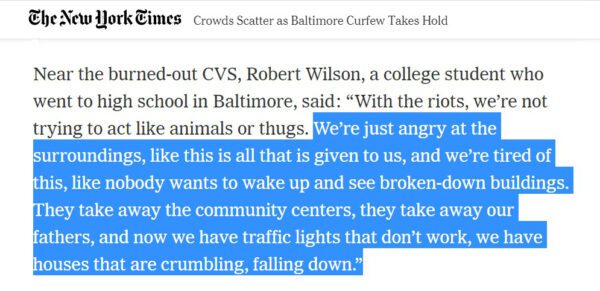Democrats have left the back door off the hinges with working-class, middle-class, and even suburban voters as they have morphed into the party of the front-door rich and elite. Their policies increasingly reflect this new dynamic and, media tropes aside, Republicans can pounce on this wide-open opportunity with aggressive, disciplined messaging encompassing plenty of strategic punching back.
The media is working overtime to bury this truth about the Democratic Party, but with every election, the Republican Party is becoming the de facto party of the middle class, working class, and working minorities, while the Democratic Party is increasingly the party of wealthy white elites.
Axios reported this obvious shift just last week under the headline: “Dramatic realignment swings working-class districts toward GOP.” And Democrats now represent nine of the 10 wealthiest congressional districts. It’s clear in fundraising and policies from mandatory electric vehicles that are financially out of reach for middle-class Americans to siccing the IRS on the gig economy of side hustles by requiring the reporting of $600 and above through Venmo, Paypal, and others.
This is low-hanging fruit in a general election for the GOP, GOP candidates, and associated PACs.
It’s simple: Build a platform around the economy, inflation, crime, uncertainty about future jobs, and parental rights. These are bread and butter issues already part of the GOP that connect with a broad swath of Americans in ways that some of the culture-war battles and presidential political dramas just do not.
This is where messaging discipline is hard, but the key is not to focus on abortion, trans issues, or for the sake of all that is good, the 2020 election. While these are all variously important issues, they can only be dealt with by winning first. During a campaign, these are weights with the middle electorate. The way you know this is true is that the media will constantly try to force Republicans to talk about only those issues—because they know it hurts them in a general election.
Further, Republicans cannot get sucked directly into the weaponization of the judicial system, as true as that may be, because, in one step, that will devolve into being forced to defend Donald Trump. Good for the Trump team. Bad for attracting the middle voters who sway elections. Win first.
So the GOP needs candidates who can articulately stay on message about kitchen table issues for middle-class Americans while at the same allowing PACs to target the most egregious cultural issues from the Left, and those are some big targets—transgenderism, abortion up to birth, boys in girls’ locker rooms, open borders leading to human trafficking and atrocious levels of fentanyl deaths, and the two-tiered justice system.
It’s about to get even easier. Joe Biden is ready to gift the GOP and particularly PACs with self-writing ads as he has promised to veto a bill that would prevent biological males from playing in women’s sports. This is tailor-made as Biden’s position is deeply unpopular among Americans, but elites like it. The thing about elites is that, by definition, there are not that many of them.
PACs can bypass the media, and Republican candidates can explain when asked that the PACs are independent actors, and then surgically strike against the media when there is an opportune moment. Always put the media on defense in public press conferences when all the video is rolling.
And every candidate needs to realize that he can, and should, ignore the corporate media in “editable” situations. Think of newspapers, written content, and TV or online shows where the reporter interviews a candidate for an hour and then uses two out-of-context quotes. Never do those. Consent only to live interviews or press conferences where everyone sees everything. The old-school, former mainstream media has been completely unmasked as the propagandist arm of the Democratic Party and allied statist interests. Any Republican candidate who does not understand this is not the right person for the job. Period.
GOP candidates still trying to play nice and grant interviews to CNN, ABC/CBS/NBC, NPR, the New York Times, Washington Post, or the rest of the compendium of nefarious outlets are just out of touch with the new rules. They will be screwed by those outlets, and more importantly, they don’t need them.
Republican voters already understand this. Florida Governor Ron DeSantis proved the worth of this strategy. In his first term, he went to war with the media, not with flailing haymakers, but with brutal surgical take-downs in press conference settings, and then only did sit-down interviews with friendly media. And he went from a 2018 win of a fraction of a percent, to winning by 19 points four years later in a state with almost exactly equal registration between Republicans and Democrats. Republicans must understand that the old media is Democratic media operatives, but they have the option to use the alternative media that provides the kind of friendly setting Democrats get from the aforementioned dinosaur media.
Remember Joe Biden sold himself as a return to normalcy, a traditional American president after the Trump years, but has governed as the most radical, leftist president in history, breaking every norm and tradition. Lunchbucket Joe wants men to be allowed to strip down and change in women’s locker rooms and bathrooms. Good Ol’ Joe wants abortions up to the moment that the baby is exiting the birth canal. Blue Collar Joe wants Christians to be forced against their beliefs to bake a cake for a gay wedding when there are a hundred willing bakers available.
But Biden did not run on any of those issues. Well, he barely ran at all. And that is the point. His reputation as a traditionalist returning the White House to normalcy was his campaign.
The rules have changed, and Republicans who don’t catch up will not be winning. So catch up, play hardball by the new harsh rules, see the media as the enemy, hammer on kitchen table issues, let PACs savage opponents, and then walk through the wide open back door to the votes of the vast middle class. This will work up and down the ballot because the Democratic base will not allow their candidates to back off anything.
This may sound distasteful, but we are in a nauseating time of trying to save America from the hate-America-first deconstructionists. Distastefulness is only part of the price to pay if Republicans and conservatives really want to save the nation, and not just be liked by elites.




















